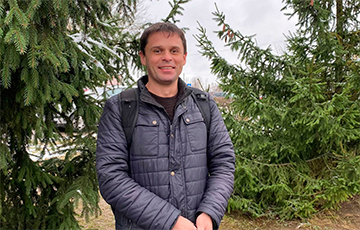"I Have Never Heard That Anyone Is Going to Stop Going to Rallies"
1- 30.11.2020, 15:57
- 22,271

PHOTO: RADio svaboda
After 15 days of arrest, journalist Andrei Rabchyk was released.
Andrei Rabchyk was detained at about noon on November 15 in a room at the Orbita hotel. On the same day, 24 more journalists were detained throughout Belarus. The operator was tried the next day, November 16. Not only Andrei's colleagues, but even his lawyer could not get to the trial, Radio Svaboda reports.
"My trial lasted a good five minutes," says Andrei. "They "sewn" to me the Article 23.34 of the Administrative Code, participation in public events. Ivan Ivanov was the witness. He said that I was walking down the street, and, in my hands, I was holding banners, flags, and other symbols. Although, at that time, I was on the 10th floor of the Orbita hotel, I was filming a video from the hotel room through the window. Everything was very fast, I could not even ask for a lawyer. I sat down on a chair in front of my laptop and already had to get up."
Andrei and his colleagues were detained right in the room. People in civilian clothes entered, introduced themselves as police officers, and took the journalists first to the police department and then to Akrestsina Street. Andrei spent the night there, and there he gave testimony via Skype during the trial. Soon after the trial, he and other people detained on November 15 were transported in paddy wagons to Zhodzina. The fact that he is a journalist did not interest any of the law enforcement officers.
"I haven't been asked much anywhere," says Andrei. "They gave me the protocol, and that's it. When I saw the protocol in the police department, my eyes widened. He said that I was a journalist, that I did not participate in the procession, and that I was not even on the street then, I was at the hotel. But this did not interest anyone. They said that I could appeal, I could do whatever. In general, they treated me just fine. In Zhodzina, they greeted us harshly. They shouted and hit several people. They said we were moving slowly. But when they were driven into the cell, it was all over. Zhodzina has a peculiar prison regime. It's easier on Akrestsina Street. As I understand it, Akrestsina's reputation must now be "bleached," so it's more good-natured there."
Andrei says that, in Zhodzina, he first got into a 6-bed cell with 12 people in it. I had to sleep wherever I could. But the next day, everyone was scattered in other cells, and there was enough space.
"Most of them are entrepreneurs; there are a lot of small business representatives," says Andrei. "We had one IT specialist. There was only one commodity expert, a very educated guy. But the bulk is individual entrepreneurs. It was difficult to read books in the cell; there were 6 people there, and someone was constantly talking. That is why I mostly did not read books. Crosswords were my salvation. The whole cell was solving them, as well as played dominoes. It turns out to be very fun and reckless. And this was allowed."
Until the end of September, Andrei worked as an accredited journalist of the Belarusian service Radio Svaboda. After he submitted new documents for re-accreditation, there is still no response from the Foreign Ministry. Andrei was already detained several times while working at protest rallies in the summer, but after checking his documents and several hours in the police department, he was released. The journalist got to the "day" for the first time.
"It was the first time I was in such conditions, so everything was new for me," says Andrei. "I didn't know, for example, that the dishes should be washed by ourselves. And that it is desirable that the care packages contain dishwashing detergent because the water in the chambers is only cold, and it is problematic to wash something. But these are small things. Nothing struck me there."
According to the journalist, people in detention not only do not change their political views but also become radicalized.
"I have never seen anyone scared in the cells," says Andrei. "People are really angry. Everyone says that they knew about the injustice before, but the detention and arrest only made them angry. I have never heard from anyone that someone is going to stop going to rallies. They will run faster, that's true. And I've never heard anyone saying that they won't come out again. People are determined to fight, and they are released angry. I don't know what the government wants to achieve."
According to the journalist, the detainees are allowed to shower once a week in the Zhodzina prison. There were also walks, but not every day, as stated in the daily schedule. The prisoners were taken out into a small courtyard 3 by 3 meters with the checkered sky. But they tried to take advantage of this moment since this is the only opportunity to smoke legally.
"The guards are different," Andrei says about his guards. "They look no different from those who have been behind bars for years besides the uniform. They have some kind of "blatnyak" on their ringtones. One supervisor greeted us one day with the words "Good morning, collaborators." And so on. Those who are older are more good-natured. Young people are "rvachi." They can say: "why are you lying? We have a regime and order." They did not try to talk about political topics. They only asked if we had any complaints or suggestions. They played a set of patriotic songs on our internal radio. There, among others, was Danchyk's song "Belarus is mine." They probably didn't know who he was."









